Malinowski Bronislaw

Bio: (1884–1942) Polish-British anthropologist. Bronisław Malinowski was born in Kraków, the town that is today in Poland but was then part of the Austro-Hungarian Empire. He first studied at Jagiellonian University in Kraków, after that he spent three semesters at the University of Leipzig where he studied under psychologist Wilhelm Wundt and economist Karl Bücher, and then continued his studies in Britain, studying ethnology at the London School of Economics. His first book in English, The Family Among the Australian Aborigines (1913) was done under the supervision of famous anthropologist Edward Westermarck, and it presented a rebuke of evolutionary theories in anthropology. During World War I Malinowski did long ethnographic research in Australia, Papua, and the Trobriand Islands. After WW I he returned to Britain and started teaching at the London School of Economics. Malinowski later did ethnographic work in Tanganyika and in Mexico, and at the end of his career (and life) moved to the USA where he taught Yale.
Although he used the term „savage“ for the people he studied in Oceania, Malinowski believed that the „savage“ individuals are as rational, moral, and technologically savvy as „civilized man“. People all over Oceania believed in magic, but only when their technology couldn't guarantee a positive outcome. In the first book written after his own ethnographic research and based on his data, Argonauts of the Western Pacific (1922) he studied the practice of kula, the circular exchange pattern of ceremonial and valuable sea shells in the archipelago of Trobriandan islands. In the book Crime and Custom in Savage Society (1926) Malinowski studied the political and legal system in the Trobriandan islands. Malinowski questioned the Freudian theory that sees Oedipal Complex as universal for humanity in the Sex and Repression in Savage Society (1927). Malinowski argued that in the matrilineal Trobriands society mother’s brother, and not the father, is the primary familial authority figure; while the boy’s incestuous desire was focused on the sister, and not on the mother. The rise of totalitarian regimes in Europe after WW I scared Malinowski so he become a tenacious and determined opponent of these systems and his book Freedom and Civilization (1944b) is the best example of this effort.
Malinowski is best known for his theoretical and methodological approach called functionalism. He championed „Participant observation“ and what he called „thick description“, both of which focus on the contemporary context of researched society and not on its (speculative) historical development, as the best ethnographic method. The theoretical basis of functionalism draws on Durkheim and his view that societies are sui generis phenomena, which should be studied in their totality. Starting from the viewpoint of methodological individualism, Malinowski builds his theory of culture as a system that exists to satisfy individual human needs. Human needs are based on innate biological heritage which influences all world cultures. He divides needs into primary (only based on biology) and derived (secondary) that are formed in the interplay of culture and biology.
There are seven pairs of primary needs and their corresponding cultural responses. Basic needs are: 1) metabolism, 2) reproduction, 3) bodily comforts, 4) safety, 5) movement, 6) Growth, 7) Health; and the cultural responses are 1) commissariat, 2) kinship, 3) shelter, 4) protection, 5) activities, 6) training, 7) hygiene. Family is the universal form for satisfying primary (reproduction) and secondary (education) needs. He wants to understand how custom is used in the present and how it fits together with others to form an integral society. Language is also universal, and function is what determines the form, as with all the other cultural patterns.
He sees his approach as a „scientific theory of culture“ and the key and necessary concept in that theory is „institution“, and every institution is defined by the biological need that it satisfies. All the institutions form the integrated and interconnected whole, where every institution, or its change or absence, directly influences all the others. Malinowski's view of culture and institution is individual, utilitarian, integralist, and instrumental. Every institution has six aspects: charter, personnel, norms, material apparatus, activities, and function. He explains the relationship between different aspects of the institution this way: „Organized on the charter, acting through their social and organized cooperation, following the rules of their specific occupation, using the material apparatus at their disposal, the group engages in the activities for which they have organized“ (Malinowski, 1944a: 53). It is important to note that several institutions can serve the same need, while single institution can serve to satisfy several different needs.
Malinowski's functionalism enables anthropologists to understand the behavior of the „primitive“ subject, because, although some of their behavior can seem irrational to the modern onlooker, that behavior functions to serve some, on the surface, hidden need. Magic, for example, serves to help the individual cope with his or her uncertainty or fears. Complex systems of kinship and lines of kinship (usually stemming from totemic animal or plant) also serve to arrange and regulate relations between individuals and families. Similarly, myth has the function to strengthen tradition giving it a sacred and supranatural aura. Religion also uses opulence and ceremonies to sanctify cultural customs and beliefs.
Fields of research
Agriculture Anthropology Authority Civilization Community Cooperation Crime Culture Customs, Social Education Evolution Family Freedom Human Nature Incest Instincts Integration Kinship Knowledge Language Law Leaders Magic Market Morality Myth Psychology Rationality Religion Science Sex Taboo Tradition TribeTheoretical approaches
Structural Functionalism (anthropological)Main works
The Family Among the Australian Aborigines (1913);
Argonauts of the Western Pacific (1922);
Crime and Custom in Savage Society (1926);
Sex and Repression in Savage Society (1927);
The Sexual Life of Savages (1929);
Coral Gardens and their Magic, 2 vols. (1935);
A Scientific Theory of Culture (1944a);
Freedom and Civilization (1944b);
A Diary in the Strict Sense of the Term (1967).

